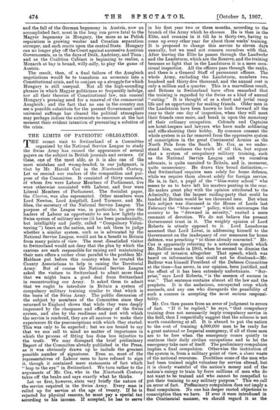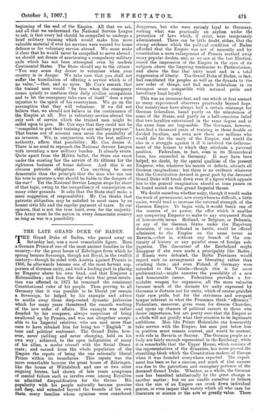THELIMITS OF PATRIOTIC OBLIGATION. T HE recent visit to Switzerland of
a Committee organised by the National Service League to study the Swiss Army has caused the appearance of several papers on the subject in British journals and reviews. Of these, one of the most able, as it is also one of the most mistaken and wrong-headed, in our judgment, is that by Mr. Harold Cox in the Nineteenth, Century. Let us remind our readers of the composition and pur- pose of the Committee. It consisted of thirty members, of whom five were Labour Members of Parliament, five were otherwise associated with Labour, and four were Liberal Members of Parliament. The Socialist paper, the Clarion, was also represented. Other members were Lord Newton, Lord Ampthill, Lord Tumour, and Mr. Shee, the secretary of the National Service League. The purpose of the League was, in particular, to give the leaders of Labour an opportunity to see how lightly the Swiss system of military service (it has been paradoxically, but intelligibly and justly, called " Compulsory Volun- teering ") bears on the nation, and to ask them to judge whether a similar system, such as is advocated by the National Service League, would not be a benefit to Britain from many points of view. The most dissatisfied visitor to Switzerland would not deny that the plan by which the cantons are each responsible for raising and maintaining their men offers a rather close parallel to the problem Mr. Haldane put before this country when he created the County Associations to help in raising the Territorial Army. But of course the National Service League asked the visitors to Switzerland to admit more than that we might learn a good deal from Switzerland in reconstructing our Army. It asked them to admit that we ought to introduce in Britain a system of compulsory military training similar to that which is the basis of the Swiss Army. The public discussion of the subject by members of the Committee since they returned to England shows that while they were deeply impressed by the cheapness and efficiency of the Swiss system, and also by the readiness and zest with which the service is rendered, they are all anxious to make their experiences fit the preconceptions with which they started. This was only to be expected ; but we are bound to say that we can call to mind no matter of importance in which the process of fitting has done less injustice to the truth. We may disregard the brief preliminary Report of the Committee already published in the Press, as it was obviously drawn up to include the greatest possible number of signatures. Even so, most of the representatives of Labour seem to have refused to sign it, though it contained mere statements of fact which " leap to the eye " in Switzerland. We turn rather to the arguments of Mr. Cox, who in the Nineteenth Century takes off the brake and says exactly what he thinks.
Let us first, however, state very briefly the nature of the service required in the Swiss Army. Every man is called up for service at the age of twenty. If he is rejected for physical reasons, he must pay a special tax according to his income. If accepted, he has to serve in his first year two or three months, according to the branch of the Army which he chooses. He is then in the Elite, and remains in it till he is thirty.two, having to come up every other year for about three weeks' training. It is proposed to change this service to eleven days annually, but we need not concern ourselves with that. After leaving the Elite he passes through the Landwehr and the Landsturm, which are the Reserve, and the training becomes so light that in the Landsturm it is a mere occa- sional inspection. All the officers pass through the ranks, and there is a General Staff of permanent officers. The whole Army, excluding the Landsturm, numbers two hundred and thirty-five thousand, and the annual cost is only a million and a quarter. This is a marvellous result, and Britons in Switzerland have often remarked that the training is regarded by the Swiss as a kind of annual " outing." It is thought of as a short and jovial camp life and an opportunity for making friends. Older men in the Landsturm have been known to look forward all the year to their one day of inspection, when they will meet their friends once more, and break in upon the monotony of their ordinary occupation. Colonels and Captains are hotel-keepers and lawyers who have made soldiering and rifle-shooting their hobby. By common consent the whole system is as far removed from the oppressive systeni of conscription in the great Continental Armies as the North Pole from the South. Mr. Cox, as we under- stand him, confesses the truth of all this, but argues that a system of compulsory military training, such as the National Service League and we ourselves advocate, is quite unsuited to Britain, and is, moreover, quite unnecessary. He draws this broad distinction,— that Switzerland requires men solely for home defence, while we require them almost solely for foreign service. He is, in fact, a pupil of the " blue-water school " who seems to us to have left his masters panting in the rear. He makes great play with the opinion attributed to the Admiralty, that the largest raiding-party that could be landed in Britain would be ten thousand men. But when this subject was discussed in the House of Lords last February the " blue-water " policy, which encourages the country to be "drowned in security," excited a mere remnant of devotion. We do not believe the present Government trust in it. The weighty opinion of Lord Roberts is utterly opposed to it. Lord Lansdowne assumed that Lord Lovat, in addressing himself to the Government on the inadequacy of our measures for home defence, was preaching " to those already converted." Mr: Cox is apparently referring to a notorious speech which Mr. Balfour made in 1905, when he seemed to dismiss the danger of invasion altogether. That speech, which was based on information that could not be disclosed—Mr. Balfour was himself President of the Defence Committee at the time—has never, in our opinion, been justified, and the effect of it has been extremely unfortunate. " Sur- prise," says Lord Roberts, " is the essence of success in war." That sentence contains almost all the law and the prophets. It is the audacious, unexpected coup which succeeds, and any one who disregards the possibility of such a success is accepting the most serious response. bility.
Mr. Cox then passes from an error of judgment to errors of fact. " If it be replied," he says, " that compulsory training does not necessarily imply compulsory service in the field, then I respectfully suggest that the scheme is not worth considering at all. It is absurd to put the nation to the cost of training 4,000,000 men to be ready for a great national or Imperial emergency, if all of these men are to be free when the emergency comes quietly to continue their daily civilian occupations and to let the emergency take care of itself. The preliminary compulsion implies a final compulsion. Otherwise the institution of the system is, from a military point of view, a sheer waste Of the national resources. Doubtless some of the men who had been trained might volunteer for service abroad, but it is clearly wasteful of the nation's money and of the nation's energy to train by force millions of men who do not want to be trained and who cannot be compelled to put their training to any military purpose." This we call an error of fact. Preliminary compulsion does not imply a final compulsion. No one has deeper rooted objections to conscription than we have. If ever it were introduced in the Continental manner, we should regard it as the beginning of the end of the Empire. All that we ask, and all that we understand the National Service League to ask, is that every lad should be compelled to undergo a brief military training which would make him more valuable material if ever his services were wanted for home defence or for voluntary service abroad. We must make it clear that he would never be compelled to serve abroad ; we should not dream of sanctioning a compulsory military exile which has not been attempted even by modern Continental States. The State should say to the citizen : "You may some day desire to volunteer when your country is in danger. We take care that you shall not suffer the humiliation of offering a service which is of no value,"—that, and no more. Mr. Cox's remark that the trained men would " lie free when the emergency comes quietly to continue their daily civilian occupations and to let the emergency take care of itself " does a rare injustice to the spirit of his countrymen. We go on the assumption that they will volunteer. If we did not believe that, we should not believe in the continuance of the Empire at all. Nor is voluntary service abroad the only sort of service which the trained men might be called upon to give. Mr. Cox says that they could not be "compelled to put their training to any military purpose." That leaves out of account once more the possibility of an invasion. We, in conjunction with the best military authority, affirm that possibility ; Mr. Cox denies it. There is no need to reproach the National Service League 'Stith inventing a new military burden. It already exists. Quite apart from the Militia ballot, the State can exact under the existing law the sereiee of its citizens for the righteous business of home defence. And this is an obvious patriotic obligation. Can anything be more democratic than the principle that the man who can use his vote to procure a war should be liable to the dangers of the war ? Yet the National Service League stops far short of that logic, owing to the inexpediency of conscription on many other grounds. It asks that the State shall make a mere suggestion of responsibility. Mr. Cox thinks that patriotic obligation may be satisfied in most cases by an honest civic life and the regular payment of taxes. In our opinion, that is not the true limit, even for the majority. The Army must be the nation in every democratic country so long as war is a possibility.































































 Previous page
Previous page